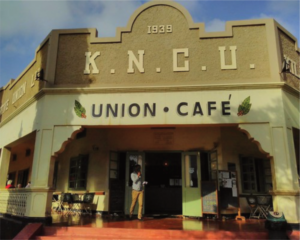
Photo: K.N.C.U Union Café (Ouma, 2016)
Author: Henrike Haggeney
Called a “first-choice business model for locally based, locally controlled community development”, cooperatives have been praised for having the potential to uplift far more people out of poverty into the “socio-economic mainstream” than other business structures while having the advantage of lifting groups instead of individuals (Majee and Hoyt 2011: 51). The aims of cooperatives are to serve a broad set of socio-economic objectives such as self-help, grassroots participation, income distribution, exploitation of economies of scale, social control over resources and productivity increase (Sumelius et al. 2013: 9-10).
Tanzania´s cooperative movement today is large in terms of membership numbers, but it makes up just a fraction of its size of the 1950/60s. In 2012, cooperatives in Tanzania had a total membership of 1.6 million (Sumelius et al. 2013: 6). The Tanzania Coffee Board is a government body, responsible for the regulation and control of the coffee sector through issuing licenses for all different activities in the sector. At the official coffee auction in Moshi, licensed exporters buy coffee from the suppliers, which can be either cooperatives or private buyers.
Read more: Cooperative Development
